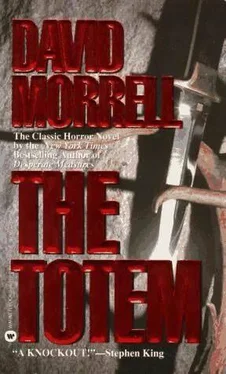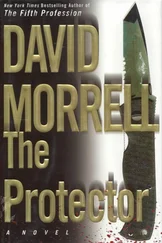David Morrell - The Totem
Здесь есть возможность читать онлайн «David Morrell - The Totem» весь текст электронной книги совершенно бесплатно (целиком полную версию без сокращений). В некоторых случаях можно слушать аудио, скачать через торрент в формате fb2 и присутствует краткое содержание. Жанр: Триллер, на английском языке. Описание произведения, (предисловие) а так же отзывы посетителей доступны на портале библиотеки ЛибКат.
- Название:The Totem
- Автор:
- Жанр:
- Год:неизвестен
- ISBN:нет данных
- Рейтинг книги:4 / 5. Голосов: 1
-
Избранное:Добавить в избранное
- Отзывы:
-
Ваша оценка:
- 80
- 1
- 2
- 3
- 4
- 5
The Totem: краткое содержание, описание и аннотация
Предлагаем к чтению аннотацию, описание, краткое содержание или предисловие (зависит от того, что написал сам автор книги «The Totem»). Если вы не нашли необходимую информацию о книге — напишите в комментариях, мы постараемся отыскать её.
The Totem — читать онлайн бесплатно полную книгу (весь текст) целиком
Ниже представлен текст книги, разбитый по страницам. Система сохранения места последней прочитанной страницы, позволяет с удобством читать онлайн бесплатно книгу «The Totem», без необходимости каждый раз заново искать на чём Вы остановились. Поставьте закладку, и сможете в любой момент перейти на страницу, на которой закончили чтение.
Интервал:
Закладка:
This at last was his great truth, the story he had worked for, and he couldn't bear to watch it. He was a loser, not because he drank too much so often or because he had that trouble with his wife or because the big investigations never came his way. He was a loser simply because he wasn't the man he thought he was. He had run in panic with the other men toward the cliff. He had been the first man to climb in a frenzy up the trestle. He had known reporters who in Vietnam had stood with soldiers in the shriek of battle. He had known other reporters, who had clambered into burning buildings or had waded into flooding rivers or had argued with a gunman holding hostages.
Not him, though. He had always said that he just never had the chance, but now he knew he didn't want the chance. When the opportunity occurred, he'd persistently avoided the chance. Now he saw the battle raging closer to the tunnel, and in fright, the stench of his voided bowels much worse, he groped backward, farther along the tunnel, fleeing. He gripped at the timbers. He felt along the clammy walls, and then he understood that, while he had befouled himself and caused this obscene stench, another stench was in here too, and despite his revulsion, he didn't understand his compulsion to fumble toward it.
From the change in sound, he realized that he was in a chamber, and he had a flashlight in the pack that Slaughter had lent him. Bringing out the light, switching it on, he scanned the chamber.
He moaned.
No! He didn't want this. He didn't want to see it. Dear God, he had fled for sanctuary to their secret place of burial. On wooden pallets along the floor, he saw their bodies, fetid, ugly, lined in neat rows, clubs beside them, rotted meat, their arms crossed gently on their fur-skinned chests. The mass of them were maggot-ridden horrors. Others were more recent, and as he lurched hard against a slimy wall, he saw that one was moving, rising from its death-like sleep, groggy, drawing breath for energy.
Dunlap screamed as the creature turned toward him. It was frowning. In a moment, it was grinning. Sure, Dunlap thought, remembering the boy who had seemed dead and then returned to life. The virus. These things didn't know what death was. Some returned and others didn't, but they all in time were laid to rest here in the expectation that they eventually would rise again. Dunlap dimly sensed the paintings on the wall: the bear, the antelope, the deer. They leapt in rampant silent beauty, clubs and rocks drawn next to them as if the animals fled from the weapons about to strike them. And the creature was kneeling, grinning, frothing, snarling, gaining strength to spring as all the tension Dunlap had been feeling clamored for release. He screamed in fury, lashing forward, striking with his flashlight, breaking teeth. He struck again and then again, feeling cheekbones snap, eyes burst. He hit until he completely lost his strength, and what had crouched before him lay still and silent.
Dunlap wept. He sank to the floor and sobbed until he thought his mind would crack. Hitting the creature, he'd broken his flashlight. He was trapped in the darkness. From outside, he heard the battle, heard the shooting and the screaming. He was torn between his need to flee this room and his determination to avoid the battle.
But he couldn't stay here in the darkness. He heard noises. Another figure rising? He groped to his knees, then his feet, and fumbled toward the tunnel. Then he found it, and he shuffled down it, bumping against the walls.
But the tunnel went on too far. In horror, he understood that by now he should have seen the flames outside. Dear Christ, he'd gone in the wrong direction. He was in a different tunnel.
"No!" he told himself. "No!" He needed light , and then he thought about the camera. Slaughter had retrieved it from the helicopter. It dangled from a sling on Dunlap's neck. Desperate, he raised the camera and triggered its flash. At once, although briefly, he saw more paintings. A bear. An antelope. A deer. The bear who seemed to die in the winter and come back to life in the spring. The antelope and deer who, when the cunning of the hunt was ended, willingly gave up their lives to feed those who'd stalked them.
Symbols of a death cult, and as Dunlap triggered the camera's flash again, his edge of vision showed him something high on the wall that both terrified and attracted him. He knew what it was. He didn't want to see it. But he had to, and he aimed the camera. He pressed the button. The flash went off. A second's brightness, and a charcoal drawing of his nightmare appeared before him, crouched sideways, part man, part cat, part wide-andered elk, with paws and a tail, its deep eyes turning past its shoulder, glaring at him.
Dunlap was stunned, immobile. No. He insisted to himself that he hadn't seen it. This had to be a trick of his imagination. So he shifted, and his hands shook, but he nonetheless managed to aim again and trigger the camera's flash, and this time he saw more of the chamber. Not just the drawing of his nightmare, but something below it. Quiller's car. The red Corvette. The throne room. Red room. And above the car, beside Dun-lap's nightmare, was an even greater nightmare, the final obscene horror. Quiller. What had finally become of Quiller. Quiller was mounted on a cross upon the wall, his arms stretched out, his hands and feet nailed, his gaunt naked body sagging, maggots dripping, his hair and beard grotesquely long, having continued to grow after he died. They had crucified him with fervent belief in the final miracle, the expectation of his resurrection. Something cracked in Dunlap's mind. He finally discovered peace.
TWELVE
The townspeople talked about it as if years from now the story would assume the aspect of a legend, how the final battle of 1970 had taken place years later, the traumas of the past expunged with fire, how the western section of the mountains had been razed, the trestle burned, the mining town obliterated. Only ten men lived beyond the battle. Slaughter, Parsons, Lucas, Dunlap, and six others. By all logic, Slaughter should have died from his self-mutilation, but he was strong, his frame large, his constitution robust, and although he was close to death when everything was finished, Lucas cauterized the stump of his arm, then bound it. He and Parsons carried Slaughter through the pass and down the other side where they struggled across the next valley and by afternoon managed to reach a road. Dunlap almost wasn't found, but one man checked the tunnel, used a flashlight to learn its horrifying secrets, and saw Dunlap, kneeling, wide-eyed, staring up in reverence at Quiller. Dunlap never spoke again. In town, they joked that he had found religion, but the joke was poor because it wasn't any joke, it was the truth, and Dunlap's eyes were filled with silent wonder ever after. Hammel had died in the battle, clubbed to death until his skull was split in two. Parsons left town shortly after returning to it, before the investigation started. Owens had already gone, and neither man came back.
One day in late September, Slaughter managed the strength to go into town. He still was weak and light-headed, but he was alive, and that was really all he wanted, that and his new purity, his courage. He drove in to see the medical examiner. Because he had only one arm, he had to drive an automatic, and he wasn't with the force now, Rettig ran that, so he didn't have a cruiser. He parked at the house, which he had never been to, fumbled to open his car door and got out, walking across the grass. He felt off balance from the change of weight because of his missing arm, and he moved slowly, glancing at the boxes and the suitcases stacked on the porch.
The medical examiner came out to face him.
"I heard you were leaving," Slaughter said.
Читать дальшеИнтервал:
Закладка:
Похожие книги на «The Totem»
Представляем Вашему вниманию похожие книги на «The Totem» списком для выбора. Мы отобрали схожую по названию и смыслу литературу в надежде предоставить читателям больше вариантов отыскать новые, интересные, ещё непрочитанные произведения.
Обсуждение, отзывы о книге «The Totem» и просто собственные мнения читателей. Оставьте ваши комментарии, напишите, что Вы думаете о произведении, его смысле или главных героях. Укажите что конкретно понравилось, а что нет, и почему Вы так считаете.












